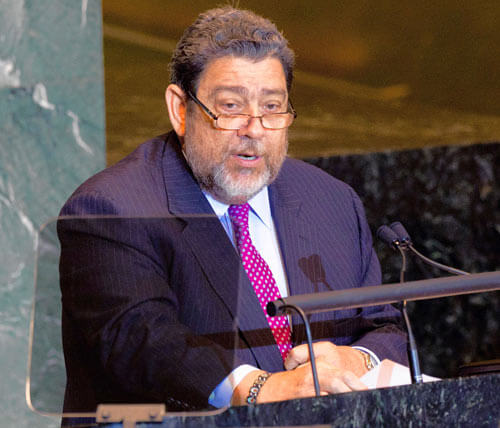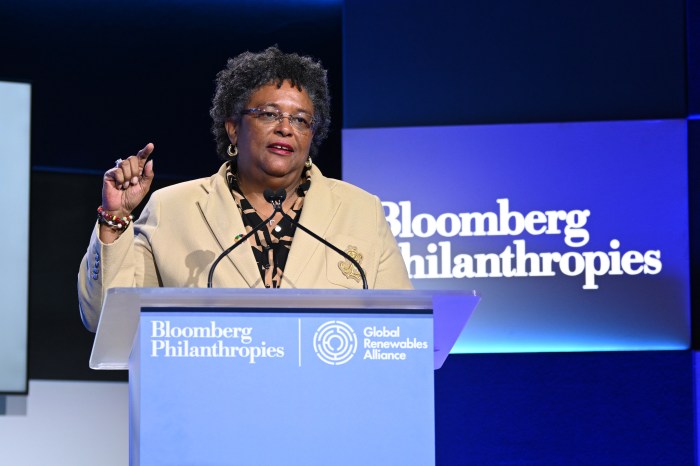Caribbean trade bloc leaders are preparing to meet at an emergency session in the coming days to review a late September ruling by a court in the Dominican Republic outlawing citizenship to more than 200,000 of its citizens because of their dark skin and also because they have ancestral links to friends and family in neighboring Haiti, which the DR traditionally disdains.
The ruling takes away citizenship for anybody born in the DR with Haitian blood or ancestry after 1929, leaving them stateless although all of them were born nowhere else but in the DR and hold automatic citizenship rights to no other country than their place of nativity.
Angered by the move and the fact that the DR has applied to join the 15-nation Caribbean Community while its court renders hundreds of thousands of people linked to Haiti as stateless, a growing number of prominent citizens including Prime Minister Ralph Gonsalves of St. Vincent have called on CARICOM to act, even expel the DR from any forum with which it has formal contact.
Haiti incidentally is a full CARICOM member nation and could very well sway other nations to deny the DR’s application to join the REGIONL grouping of nations if it so desires.
The meeting of the regional CARICOM Bureau currently comprising Michel Martelly of Haiti, Gonsalves and current chairperson, Kamla Persad-Bissessar of Trinidad, should have been held this week but was pushed back to a later date. Officials in Trinidad blamed schedule clashes for the postponement but plans are advanced for it to be held in the coming days.
The Bureau oversees affairs of CARICOM in between summits.
Meanwhile, Prime Minister Gonsalves, regional diplomats, the Caribbean Council of Churches (CCC) and a plethora of civil society organizations are mounting relentless pressure on leaders to act.
In fact, Gonsalves and others say they are so incensed by what they call an openly racist ruling against citizens because of their links to Haiti, that they are ready to take extreme measures against the DR to reverse the ruling or to put the Spanish-speaking island on the permanent isolation list.
As an indication of the level of indignation, Gonsalves has written President Nicholas Maudro of Venezuela urging him to scrub the DR from the list of countries benefitting from the 2005 Petro Caribe Initiative, forcing DR officials to beat a hasty retreat to Caracas to lobby against any possible punishment.
Additionally, the DR sits with other CARICOM nations in a grouping called CariForum, established specifically to govern trade and other relations with Europe. Many, including the Churches’ umbrella group, have called for it to be expelled from the Forum but how this will be achieved remains unclear.
Throwing in its proverbial “three cents” on the issue as well is the Caribbean Civil Society organizations (CSO), which said this week that “We are of the view that statelessness is a violation of Clause 15 of the Universal Declaration of Human Rights embraced by the international community of states,” the CSOs said, adding: ”We condemn this act as immoral, unjust and totally unacceptable in a modern, civilized society and express grave concern for the welfare of all those persons that this decision has impacted.”
Respected regional academic, Prof. Norman Girvan of the University of the West Indies said he was very disappointed by the decision not to convene the meeting. “This is a matter of extreme urgency and I hope that they can get their act together and convene a meeting as soon as possible.”
Gerard Granado, general secretary of the CCC, said the region must act fast and decisively.
“Haitians are brought into the Dominican Republic to labor on the sugar cane plantations. They are kept in barracks under horrible slave-like conditions. When you go there you see animals and human beings drinking from the same water trough and then suddenly one night, a vehicle might pass and pick up all the Haitians and take them back to the border. Women losing their husbands, children losing their parents and they don’t know what happened to them. Churches and other groups in the Dominican Republic are standing firmly against this,” Granado noted, as pressure mounts on governments to deal with the issue.
























